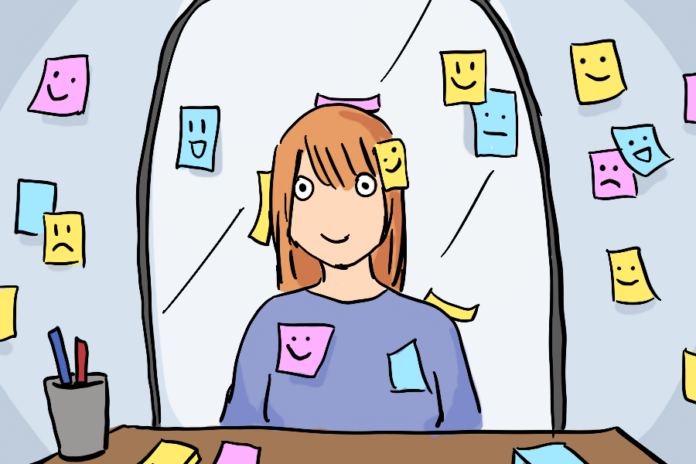Analysis is a real killjoy
By MOLLY THOMPSON – mmtthompson@ucdavis.edu
“Would you say that, overall, you’re happy?” came the voice over the phone from 380 miles away, just 20 minutes into our just-to-catch-up conversation.
“Yeah, I think so. I mean, there are definitely days where I’d say I’m not, but for the most part, yes.”
I started to think about it more: am I happy right now? There’s no reason for me not to be, so I guess so. But shouldn’t true happiness be more than an “I guess so?” Does that mean I’m not happy?
50 minutes later, when I hung up the phone, I was still thinking about it. I remembered a book I read for my 11th grade English class: “The Geography of Bliss,” by Eric Weiner. It follows a journalist as he visits 10 countries in search of the happiest place on Earth and the elusive secret to true happiness. His journey takes him to not only commonly cited paradises and places that are known for their happy populations but also to their antitheses: places wreaked with corruption and desperation.
He discovers that the Swiss are very content, but is that the same as happiness? The Netherlands is very equitable, but does that create joy? Bhutan is poor financially but rich spiritually and has a self-imposed Gross National Happiness (GNH) index that they pride themselves on — are they onto something?
A lot of Qatar is wealthy but stifled and unsatisfied with life. Iceland values failure as a necessary part of success: is that the key to creativity? Moldova is overrun with poverty and oppression, so does democracy play a part in a happy population? Thai culture encourages dropping your problems instead of worrying about them, but does forgetting about worries equate to bliss or is that just ignorance?
Happiness isn’t seen as an inherent goal in England, so do we need to actively seek it out in order to achieve it? India believes that seeking out happiness is counterproductive, so what should we be looking for? In the United States, material success is synonymous with personal fulfillment, but we report increasing levels of unhappiness every year. So what’s the answer?
In a predictably trite and still deeply unsatisfying ending, Weiner concludes that there is no secret to happiness. But what he does find to be true is that nobody actually finds happiness when they’re looking for it.
That kind of makes sense — the happiest moments of our lives are usually unplanned and spontaneous. True joy can’t be orchestrated, it has to be organic. By that logic, seeking happiness really is futile.
This is not to say that it’s completely out of our hands. From visiting Moldova, Weiner concluded that comfort is a necessary element of happiness, and we can (to a certain extent) control our comfort levels. That’s where the American ideal of material wealth as happiness comes in — material wealth often equates to comfort. Nonetheless, comfort doesn’t necessarily equal happiness; Weiner discovered that the population of Qatar has a lot of material wealth but is generally unhappy. So, comfort is a necessity for joy, but it’s not the whole equation.
What’s the missing piece? We don’t know. I think it’s different for everyone, but trying too hard to pin it down will backfire and just become another stressor.
One thing that Weiner concluded, that I’ve found particularly interesting and accurate, is that the second we try to assess our own happiness we become less happy. There’s more research to back this up too; the general consensus is that trying to put a metric on our mental satisfaction causes our ratings to decline. In other words, the more we think about how happy we are, the worse we feel.
I think this comes down to a couple of factors, with the first being the idea that analyzing how we feel forces us out of the moment we were in and into our heads. Instead of enjoying the present activity, we’re overthinking our mental and emotional state of being, so, naturally, we feel less happy.
In a similar vein, prompting us to assess our happiness is essentially asking us to think about everything in our lives that might be making us unhappy. When trying to assess how satisfied we are with our lives, we start tallying up everything that might be getting in the way of perfection. So with our attention on what’s going wrong, our happiness declines. Maybe Thai culture is onto something.
“I mean, I think I am,” I say, after we’ve been talking about it for a few minutes. The more I think about it, the less confident I am in my answer.
“Things are going well. I think for the most part, I’m pretty happy.” I’m starting to think I should stop talking. “I guess so, yeah.”
Written by: Molly Thompson — mmtthompson@ucdavis.edu
Disclaimer: The views and opinions expressed by individual columnists belong to the columnists alone and do not necessarily indicate the views and opinions held by The California Aggie









